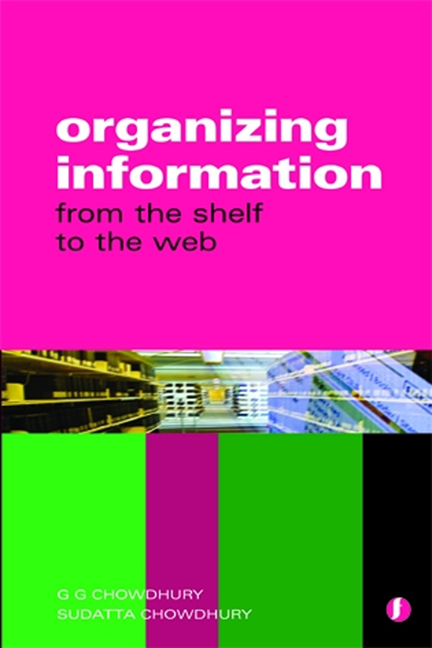Book contents
- Frontmatter
- Dedication
- Contents
- Preface
- Glossary
- 1 Organizing information: what it means
- 2 Information organization in non-library environments
- 3 Cataloguing
- 4 Bibliographic formats: MARC 21 and others
- 5 Library classification
- 6 Subject heading lists and thesauri in information organization
- 7 Organization of internet information resources
- 8 Metadata
- 9 Markup languages
- 10 Ontology
- 11 Information architecture
- 12 The semantic web
- 13 Information organization: issues and trends
- Index
13 - Information organization: issues and trends
Published online by Cambridge University Press: 10 September 2022
- Frontmatter
- Dedication
- Contents
- Preface
- Glossary
- 1 Organizing information: what it means
- 2 Information organization in non-library environments
- 3 Cataloguing
- 4 Bibliographic formats: MARC 21 and others
- 5 Library classification
- 6 Subject heading lists and thesauri in information organization
- 7 Organization of internet information resources
- 8 Metadata
- 9 Markup languages
- 10 Ontology
- 11 Information architecture
- 12 The semantic web
- 13 Information organization: issues and trends
- Index
Summary
Introduction
Organizing information has always been a complex task, and a range of tools, techniques and standards, from catalogue codes, classification schemes and subject heading lists to bibliographic formats, had to be developed to meet these challenges. These have long been used successfully in the library world for organizing, accessing and sharing information. However, the degree of complexity involved has increased enormously over the past decade or so, owing to the appearance and proliferation of internet and web technologies that have facilitated the creation, distribution and use of information by virtually anyone with access to the appropriate equipment. New tools, techniques and standards have been developed to organize and process digital information available on the internet and intranets. These include metadata standards, taxonomies, ontologies, XML, RDF, etc. The main objective of these initiatives is now to facilitate the organization and processing of information based on meaning, and the development of the semantic web. This chapter highlights new research in different areas of information organization; it aims to focus on major issues and trends. The chapter begins with a discussion of current research on cataloguing and the FRBR (Function and Requirements for Bibliographic Records) model. It then considers metadata issues, especially in the context of metadata management. The latest research related to classification, ontology and semantic portals, especially in the context of digital libraries, is then outlined. The chapter ends with a brief discussion of trends relating to recently developed approaches to user-driven information organization and processing, and thus poses some pertinent questions about the future of information organization in the digital age.
Cataloguing: FRBR and semantic catalogue networks
While the cataloguing of scholarly publications is usually performed centrally by national libraries or agencies such as OCLC, to ensure standardization, the cataloguing of internet resources, local digital library collections and freely accessible scholarly information resources – such as those available on open archives – is not controlled by any particular agency, and this poses challenges for information professionals. Mitchell and Surratt (2005) point out that appropriate measures for cataloguing discipline-based repositories, institutional repositories and open access resources are necessary in order to record, preserve and provide access to the intellectual resources of institutional and individual scholars.
- Type
- Chapter
- Information
- Organizing InformationFrom the Shelf to the Web, pp. 213 - 224Publisher: FacetPrint publication year: 2013



